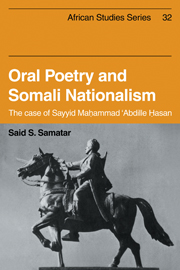Book contents
- Frontmatter
- Contents
- List of illustrations
- List of figures
- List of tables
- Note on transcription of Somali words
- Preface
- Introduction
- 1 Elements of Somali pastoral oratory: Prose
- 2 Elements of Somali pastoral oratory: Poetry
- 3 Occupation and resistance: The rise of the Somali Dervishes
- 4 Poetic oratory and the Dervish movement
- 5 Myth and the Mullah
- Notes
- Select bibliography
- Index
- Titles in the series
3 - Occupation and resistance: The rise of the Somali Dervishes
Published online by Cambridge University Press: 07 May 2010
- Frontmatter
- Contents
- List of illustrations
- List of figures
- List of tables
- Note on transcription of Somali words
- Preface
- Introduction
- 1 Elements of Somali pastoral oratory: Prose
- 2 Elements of Somali pastoral oratory: Poetry
- 3 Occupation and resistance: The rise of the Somali Dervishes
- 4 Poetic oratory and the Dervish movement
- 5 Myth and the Mullah
- Notes
- Select bibliography
- Index
- Titles in the series
Summary
The last three decades of the nineteenth century were years of fateful events and momentous developments for the Somalis. During this period the Somali peninsula was partitioned by treaty, and by conquest, among Britain, France, Italy and, most gravely in its consequences, Ethiopia.
Behind the imperial partition of Somalia lay varying motives. The principal concern of Britain was to preserve the northern Somali coast as a supplier of meat and other commodities for her Aden garrison which, given the rising importance of the Red Sea to British plans in the East, was considered vital to the defense of British India. The French, having fallen out with the British over Egypt in the 1880s, wanted a coaling station in the Red Sea to facilitate naval communication with their imperial interests in Indochina. They were, moreover, challenging British north–south expansion (the vaunted Cairo–Cape Town sphere of influence) by an east–west expansion. The French hoped to connect the Gulf of Aden with their possessions in equatorial Africa. The attempt to implement these conflicting imperial ambitions was to provoke a major crisis known as the ‘Fashoda Incident’ between France and Britain when Lord Kitchener's Anglo-Egyptian troops ran into Commandant Marchanti's column from the West Coast at Foshoda, Sudan.
Recently united and a fledgling nation themselves, the Italians were new to the game of imperial aggrandizement and were interested in staking out a piece of land on the Red Sea and Indian Ocean coasts wherever they could find one, provided they could do so without incurring the displeasure of either the French or the British.
- Type
- Chapter
- Information
- Oral Poetry and Somali NationalismThe Case of Sayid Mahammad 'Abdille Hasan, pp. 91 - 136Publisher: Cambridge University PressPrint publication year: 1982

